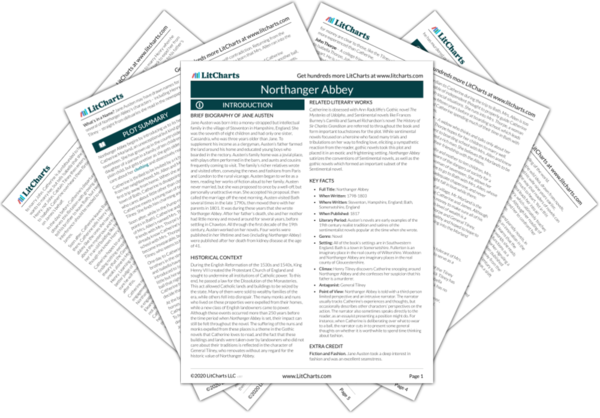Mr. Morland Quotes in Northanger Abbey
“It is not on my own account I wish for more; but I cannot bear to be the means of injuring my dear Morland, making him sit down upon an income hardly enough to find one in the common necessaries of life. For myself, it is nothing; I never think of myself.”
“I know you never do, my dear; and you will always find your reward in the affection it makes every body feel for you. There never was a young woman so beloved as you are by every body that knows you; and I dare say when Mr. Morland sees you, my dear child—but do not let us distress our dear Catherine by talking of such things. Mr. Morland has behaved so very handsome you know. I always heard he was a most excellent man; and you know, my dear, we are not to suppose but what, if you had had a suitable fortune, he would have come down with something more, for I am sure he must be a most liberal-minded man.”
“Nobody can think better of Mr. Morland than I do, I am sure. But every body has their failing you know, and every body has a right to do what they like with their own money.” Catherine was hurt by these insinuations. “I am very sure” said she, “that my father has promised to do as much as he can afford.”

Unlock explanations and citation info for this and every other Northanger Abbey quote.
Plus so much more...
Get LitCharts A+Without suffering any romantic alarm, in the consideration of their daughter's long and lonely journey, Mr. and Mrs. Morland could not but feel that it might have been productive of much unpleasantness to her; that it was what they could never have voluntarily suffered; and that, in forcing her on such a measure, General Tilney had acted neither honourably nor feelingly—neither as a gentleman nor as a parent. Why he had done it, what could have provoked him to such a breach of hospitality, and so suddenly turned all his partial regard for their daughter into actual ill-will, was a matter which they were at least as far from divining as Catherine herself; but it did not oppress them by any means so long; and, after a due course of useless conjecture, that, “it was a strange business, and that he must be a very strange man,” grew enough for all their indignation and wonder; though Sarah indeed still indulged in the sweets of incomprehensibility, exclaiming and conjecturing with youthful ardor.

Mr. Morland Quotes in Northanger Abbey
“It is not on my own account I wish for more; but I cannot bear to be the means of injuring my dear Morland, making him sit down upon an income hardly enough to find one in the common necessaries of life. For myself, it is nothing; I never think of myself.”
“I know you never do, my dear; and you will always find your reward in the affection it makes every body feel for you. There never was a young woman so beloved as you are by every body that knows you; and I dare say when Mr. Morland sees you, my dear child—but do not let us distress our dear Catherine by talking of such things. Mr. Morland has behaved so very handsome you know. I always heard he was a most excellent man; and you know, my dear, we are not to suppose but what, if you had had a suitable fortune, he would have come down with something more, for I am sure he must be a most liberal-minded man.”
“Nobody can think better of Mr. Morland than I do, I am sure. But every body has their failing you know, and every body has a right to do what they like with their own money.” Catherine was hurt by these insinuations. “I am very sure” said she, “that my father has promised to do as much as he can afford.”

Unlock explanations and citation info for this and every other Northanger Abbey quote.
Plus so much more...
Get LitCharts A+Without suffering any romantic alarm, in the consideration of their daughter's long and lonely journey, Mr. and Mrs. Morland could not but feel that it might have been productive of much unpleasantness to her; that it was what they could never have voluntarily suffered; and that, in forcing her on such a measure, General Tilney had acted neither honourably nor feelingly—neither as a gentleman nor as a parent. Why he had done it, what could have provoked him to such a breach of hospitality, and so suddenly turned all his partial regard for their daughter into actual ill-will, was a matter which they were at least as far from divining as Catherine herself; but it did not oppress them by any means so long; and, after a due course of useless conjecture, that, “it was a strange business, and that he must be a very strange man,” grew enough for all their indignation and wonder; though Sarah indeed still indulged in the sweets of incomprehensibility, exclaiming and conjecturing with youthful ardor.











